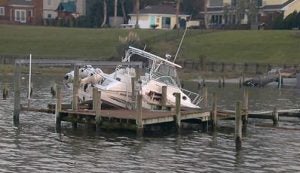Station Oregon Inlet open house kicks off National Safe Boating Week
The U.S. Coast Guard will be holding an open house at their Station Oregon Inlet location on Coast Guard Street in Nags Head on Saturday, May 18 from 10 a.m. until 2 p.m. This open house will launch the annual National Safe Boating Week campaign that runs from Saturday, May 18 through Friday, May 24.
Come to Station Oregon Inlet to see their rescue boats and meet members of the U.S. Coast Guard and other first responders. The Outer Banks Flotilla of the U.S. Coast Guard Auxiliary will also be there to support recreational boating safety. They will have games and give-a-ways for children to help them learn how long trash in the water takes to dissolve and other aspects of recreational boating including navigation, communication and equipment.
In conjunction with the kick-off at Station Oregon Inlet, the U.S. Coast Guard Auxiliary is offering a Coast Guard and NASBLA (National Boating Education Standards) approved boating safety course. This course will be also held on Saturday, May 18 and meets the boating safety education training required by NC regulations for boat and personal watercraft operators born on or after Jan 1, 1988. The class will be held at the Kitty Hawk Fire Station in Kitty Hawk and runs for 7-8 hours starting at 9.

You don’t want to have a bad day on the water. Attend the boating safety class on Saturday, May 18 at the Kitty Hawk Fire Station starting at 9 a.m.
Topics will include preparation for departure, navigation, rules of the road, safe boat operation and emergencies. The course will be taught by certified Coast Guard Auxiliary instructors with years of on-the-water experience and a few good stories to share. Passing the test at the end of the course will earn the participant their boating education certificate.
For more information about the open house at Station Oregon Inlet, contact Travis Green or Josh Whiting at 252-441-6260. For more information on the boating safety course at Kitty Hawk Fire Station, contact Keith Berntsen at 252-564-4142
The Coast Guard Auxiliary is the uniformed civilian component of the U.S. Coast Guard and supports the Coast Guard in nearly all mission areas. The Auxiliary was created by Congress in 1939. For more information about a boating course near you or to learn more about water safety or becoming one of America’s volunteer lifesavers, visit www.cgaux.org.
READ ABOUT MORE NEWS AND EVENTS HERE.
RECENT HEADLINES:

